大学英语三级语法详细讲解
- 格式:doc
- 大小:47.00 KB
- 文档页数:13
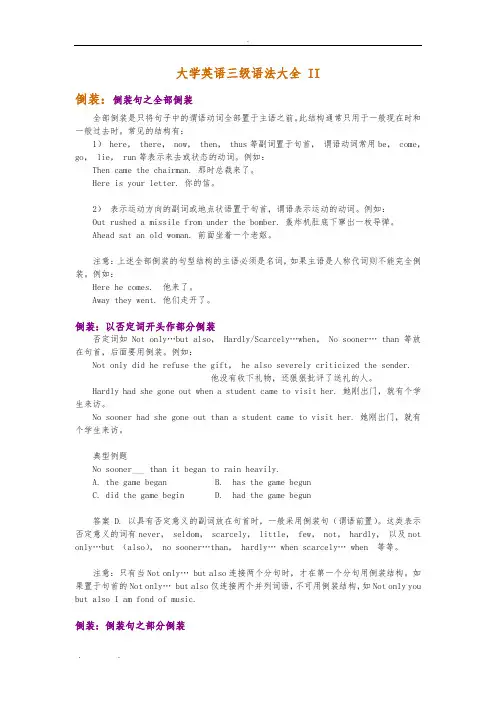
大学英语三级语法大全 II倒装:倒装句之全部倒装全部倒装是只将句子中的谓语动词全部置于主语之前。
此结构通常只用于一般现在时和一般过去时。
常见的结构有:1) here, there, now, then, thus等副词置于句首,谓语动词常用be, come,go, lie, run等表示来去或状态的动词。
例如:Then came the chairman. 那时总裁来了。
Here is your letter. 你的信。
2)表示运动方向的副词或地点状语置于句首,谓语表示运动的动词。
例如:Out rushed a missile from under the bomber. 轰炸机肚底下窜出一枚导弹。
Ahead sat an old woman. 前面坐着一个老妪。
注意:上述全部倒装的句型结构的主语必须是名词,如果主语是人称代词则不能完全倒装。
例如:Here he comes. 他来了。
Away they went. 他们走开了。
倒装:以否定词开头作部分倒装否定词如 Not only…but also, Hardly/Scarcely…when, No sooner… than等放在句首,后面要用倒装。
例如:Not only did he refuse the gift, he also severely criticized the sender.他没有收下礼物,还狠狠批评了送礼的人。
Hardly had she gone out when a student came to visit her. 她刚出门,就有个学生来访。
No sooner had she gone out than a student came to visit her. 她刚出门,就有个学生来访。
典型例题No sooner___ than it began to rain heavily.A. the game beganB. has the game begunC. did the game beginD. had the game begun答案 D. 以具有否定意义的副词放在句首时,一般采用倒装句(谓语前置)。
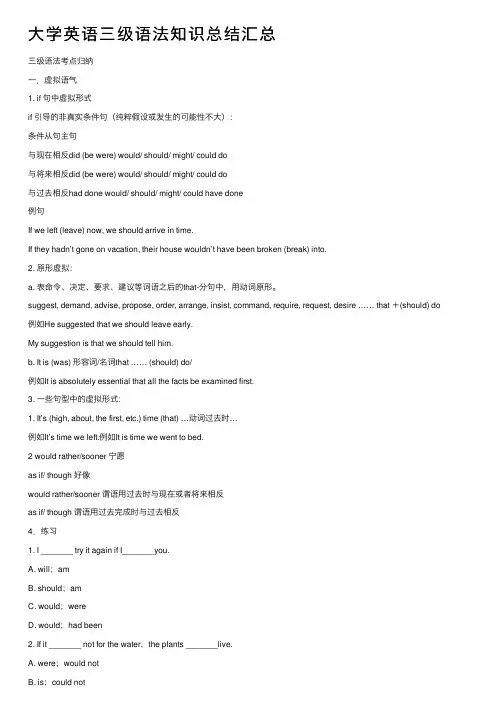
⼤学英语三级语法知识总结汇总三级语法考点归纳⼀.虚拟语⽓1. if 句中虚拟形式if 引导的⾮真实条件句(纯粹假设或发⽣的可能性不⼤):条件从句主句与现在相反did (be were) would/ should/ might/ could do与将来相反did (be were) would/ should/ might/ could do与过去相反had done would/ should/ might/ could have done例句If we left (leave) now, we should arrive in time.If they hadn’t gone on vacation, their house wouldn’t have been broken (break) into.2. 原形虚拟:a. 表命令、决定、要求、建议等词语之后的that-分句中,⽤动词原形。
suggest, demand, advise, propose, order, arrange, insist, command, require, request, desire …… that +(should) do 例如He suggested that we should leave early.My suggestion is that we should tell him.b. It is (was) 形容词/名词that …… (should) do/例如It is absolutely essential that all the facts be examined first.3. ⼀些句型中的虚拟形式:1. It’s (high, about, the first, etc.) time (that) …动词过去时…例如It’s time we left.例如It is time we went to bed.2 would rather/sooner 宁愿as if/ though 好像would rather/sooner 谓语⽤过去时与现在或者将来相反as if/ though 谓语⽤过去完成时与过去相反4.练习1. I _______ try it again if I_______you.A. will;amB. should;amC. would;wereD. would;had been2. If it _______ not for the water,the plants _______live.A. were;would notB. is;could notC. were;couldD. did;could not3. If I _______ that chance to show my ability, I _______the president of this school.A. have not had;could not becomeB. had not had;would not have becomeC. did not have;could not becomeD. doesn’t have;will not become4. He _______ by that burglar if you _______ to save him.A. might have been killed;hadn’t comeB. will be killed;didn’t comeC. may be killed;did’t comeD. could be killed;haven’t come5. If it _______for your help,I _______that hard time with so little money.A. were not;would not spendB. is not;can not spendC. had not been;would not have spentD. have not been;will not spend6. Where _______ you go if war _______?A. will;breaks outB. do;will break outC. would;were to break outD. will;is to break out7. She wishes she _______ that humiliating thing.A. doesn’t doB. didn’t doC. haven’t doneD. hadn’t done8. The chairman suggested that the meeting _______ put off.A. can beB. beC. isD. will be9. It is vital that he _______ immediately.A. should goB. must goC. goesD. went10. It is time we _______do our homework.A. begin toB. can begin toC. began toD. will begin to答案:1.选C。
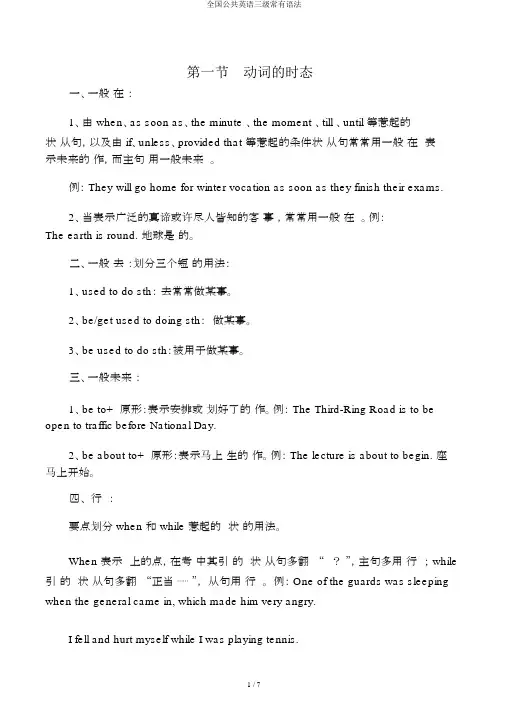
第一节动词的时态一、一般在:1、由 when、as soon as、the minute 、the moment 、till 、until 等惹起的状从句,以及由 if、unless、provided that 等惹起的条件状从句常常用一般在表示未来的作,而主句用一般未来。
例: They will go home for winter vocation as soon as they finish their exams.2、当表示广泛的真谛或许尽人皆知的客事,常常用一般在。
例:The earth is round. 地球是的。
二、一般去:划分三个短的用法:1、used to do sth:去常常做某事。
2、be/get used to doing sth:做某事。
3、be used to do sth:被用于做某事。
三、一般未来:1、be to+原形:表示安排或划好了的作。
例: The Third-Ring Road is to be open to traffic before National Day.2、be about to+原形:表示马上生的作。
例: The lecture is about to begin.座马上开始。
四、行:要点划分 when 和 while 惹起的状的用法。
When 表示上的点,在考中其引的状从句多翻“ ?”,主句多用行; while 引的状从句多翻“正当⋯⋯ ”,从句用行。
例: One of the guards was sleeping when the general came in, which made him very angry.I fell and hurt myself while I was playing tennis.五、此刻达成时:要点划分 have (has) been to:某人去过某地,表示一种经历,重申状态,能够和 once,twice ,often ,never,ever 连用;Have (has) gone to:某人在去某地的途中或已在某地,重申换作。
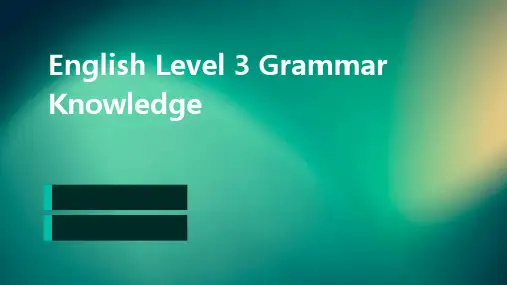
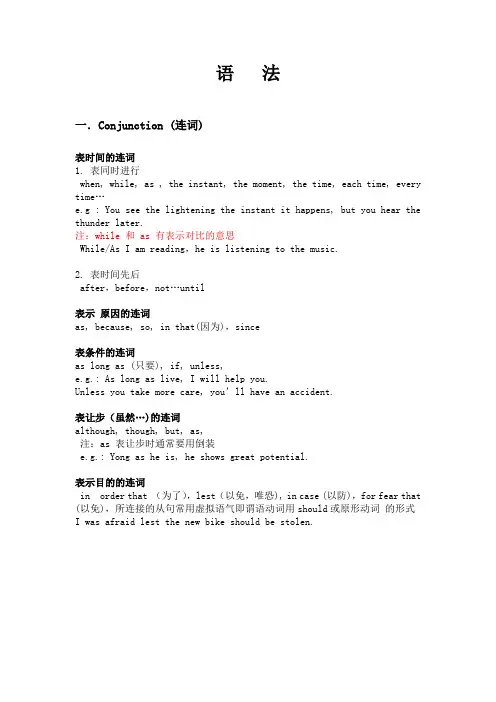
语法一.Conjunction (连词)表时间的连词1. 表同时进行when, while, as , the instant, the moment, the time, each time, every time…e.g : You see the lightening the instant it happens, but you hear the thunder later.注:while 和 as 有表示对比的意思While/As I am reading,he is listening to the music.2. 表时间先后after,before,not…until表示原因的连词as, because, so, in that(因为),since表条件的连词as long as (只要), if, unless,e.g.: As long as live, I will help you.Unless you take more care, you’ll have an accident.表让步(虽然…)的连词although, though, but, as,注:as 表让步时通常要用倒装e.g.: Yong as he is, he shows great potential.表示目的的连词in order that (为了),lest(以免,唯恐), in case (以防),for fear that (以免),所连接的从句常用虚拟语气即谓语动词用should或原形动词的形式I was afraid lest the new bike should be stolen.二.虚拟语气1. 条件句的虚拟语气表示与现在事实相反,if 从句的谓语动词用一般过去时,主句的谓语动词用should, would, could, might 等加动词原形。
I wouldn’t buy the book if I were you.表示与过去事实相反,if 从句的谓语动词用过去完成时,主句的谓语动词用should, would, could, might 等加动词完成时。
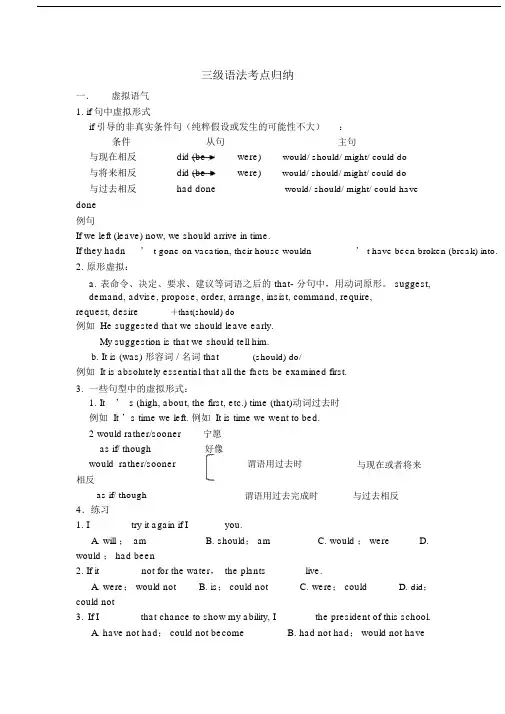
三级语法考点归纳一.虚拟语气1.if 句中虚拟形式if 引导的非真实条件句(纯粹假设或发生的可能性不大):条件从句主句与现在相反did (be were)would/ should/ might/ could do与将来相反did (be were)would/ should/ might/ could do与过去相反had done would/ should/ might/ could havedone例句If we left (leave) now, we should arrive in time.If they hadn’ t gone on vacation, their house wouldn’ t have been broken (break) into.2. 原形虚拟:a. 表命令、决定、要求、建议等词语之后的 that- 分句中,用动词原形。
suggest,demand, advise, propose, order, arrange, insist, command, require,request, desire+that(should) do例如 He suggested that we should leave early.My suggestion is that we should tell him.b. It is (was) 形容词 / 名词 that(should) do/例如 It is absolutely essential that all the facts be examined first.3.一些句型中的虚拟形式:1. It’ s (high, about, the first, etc.) time (that)动词过去时例如 It ’s time we left. 例如 It is time we went to bed.2 would rather/sooner宁愿as if/ though好像would rather/sooner谓语用过去时与现在或者将来相反as if/ though 谓语用过去完成时与过去相反4.练习1. I _______ try it again if I_______you.A. will ; amB. should; amC. would ; wereD.would ; had been2. If it _______ not for the water, the plants _______live.A. were; would notB. is; could notC. were; couldD. did;could not3.If I _______ that chance to show my ability, I _______the president of this school.A. have not had; could not becomeB. had not had; would not havebecomeC. did not have; could not becomeD. doesn’thave;will not become4. He _______ by that burglar if you _______ to save him.A. might have been killed; hadn’t comeB. will be killed; didn’t comeC. may be killed; did’t comeD. could be killed; haven’t come5. If it _______for your help, I _______that hard time with so little money.A. were not; would not spendB. is not; can not spendC. had not been; would not have spentD. have not been; will not spend6. Where _______ you go if war _______A. will; breaks outB. do; will break outC. would; were to break outD. will; is to break out7. She wishes she _______ that humiliating thing.A. doesn’t doB. didn’ t doC. haven’ t doneD. hadn’t done8. The chairman suggested that the meeting _______ put off.A. can beB. beC. isD. will be9. It is vital that he _______ immediately.A. should goB. must goC. goesD. went10. It is time we _______do our homework.A. begin toB. can begin toC. began toD. will begin to答案:1.选 C。
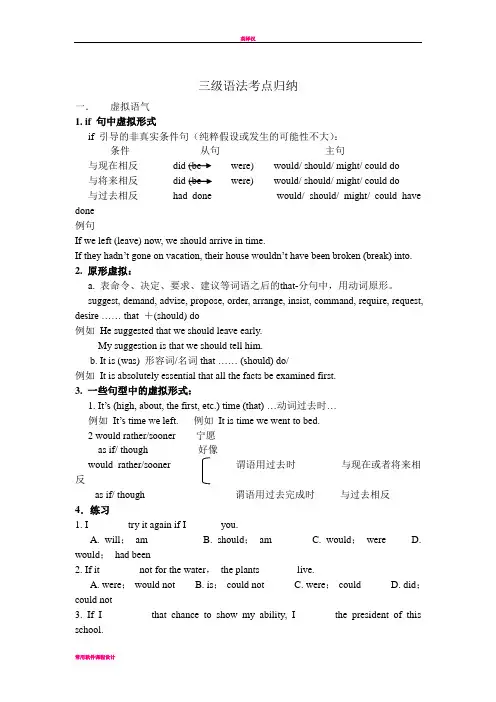
三级语法考点归纳一.虚拟语气1. if 句中虚拟形式if 引导的非真实条件句(纯粹假设或发生的可能性不大):条件从句主句与现在相反did (be were) would/ should/ might/ could do与将来相反did (be were) would/ should/ might/ could do与过去相反had done would/ should/ might/ could have done例句If we left (leave) now, we should arrive in time.If they hadn’t gone on vacation, their house wouldn’t have been broken (break) into.2. 原形虚拟:a. 表命令、决定、要求、建议等词语之后的that-分句中,用动词原形。
suggest, demand, advise, propose, order, arrange, insist, command, require, request, desire …… that +(should) do例如He suggested that we should leave early.My suggestion is that we should tell him.b. It is (was) 形容词/名词that …… (should) d o/例如It is absolutely essential that all the facts be examined first.3. 一些句型中的虚拟形式:1. It’s (high, about, the first, etc.) time (that) …动词过去时…例如It’s time we left.例如It is time we went to bed.2 would rather/sooner 宁愿as if/ though 好像would rather/sooner 谓语用过去时与现在或者将来相反as if/ though 谓语用过去完成时与过去相反4.练习1. I _______ try it again if I_______you.A. will;amB. should;amC. would;wereD. would;had been2. If it _______ not for the water,the plants _______live.A. were;would notB. is;could notC. were;couldD. did;could not3. If I _______ that chance to show my ability, I _______the president of this school.A. have not had;could not becomeB. had not had;would not have becomeC. did not have;could not becomeD. doesn’t have;will not become4. He _______ by that burglar if you _______ to save him.A. might have been killed;hadn’t comeB. will be killed;didn’t comeC. may be killed;did’t comeD. could be killed;haven’t come5. If it _______for your help,I _______that hard time with so little money.A. were not;would not spendB. is not;can not spendC. had not been;would not have spentD. have not been;will not spend6. Where _______ you go if war _______?A. will;breaks outB. do;will break outC. would;were to break outD. will;is to break out7. She wishes she _______ that humiliating thing.A. doesn’t doB. didn’t doC. haven’t doneD. hadn’t done8. The chairman suggested that the meeting _______ put off.A. can beB. beC. isD. will be9. It is vital that he _______ immediately.A. should goB. must goC. goesD. went10. It is time we _______do our homework.A. begin toB. can begin toC. began toD. will begin to答案:1.选C。
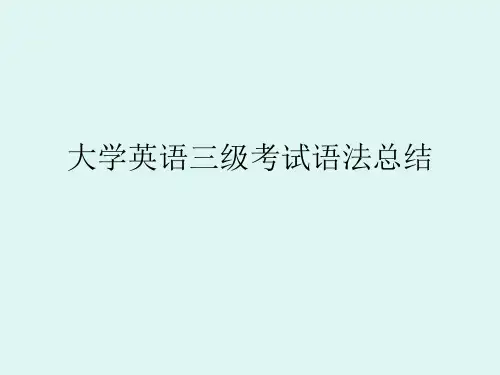
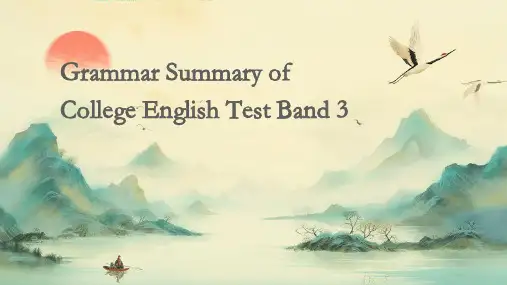
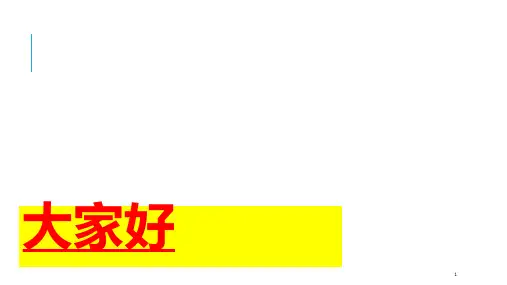

1.It作先行主语和先行宾语的一些句型She had said what it was necessary to say.2.强调句型It is not who rules us that is、2. 强调句型It is not who rules us that is important,but how he rules us3. "All 抽象名词"或"抽象名词itself"(very 形容词)He was all gentleness to her.4. 利用词汇重复表示强调A crime is a crime a crime.5. "something(much)of"和"nothing(little)of" "something of"相当于"to some extent",表示程度。
在疑问句或条件从句中,则为"anything of ",可译为"有点","略微等。
""译为毫无","全无"。
"much of"译为"大有","not much of"可译为"算不上","称不上","little of"可译为"几乎无"。
something like译为"有点像,略似。
"6. 同格名词修饰是指of前后的两个名词都指同一个人或物,"of"以及它前面的名词构一个形容词短语,以修饰"of"后面的那个名词。
如"her old sharper of a father",可译为:"她那骗子般的父亲"。
.. .. .. 参考材料 英语语法:被动语态的“一般”和“特殊” 在被动句中,主语是动作的承受者,它主要用于强调动作的承受者或因为动作的执行者难以说出或不必说出时。我们在学习运用它时,应注意以下两个方面: 一、掌握被动语态的一般结构 被动语态基本形式为:助动词be +过去分词。助动词be有时态、人称和数的变化,我们可以通过be的不同变化形式推出各种时态的被动语态形式。如: The film is being shown now. 电影正在放映。(现在进行时的被动语态) Dr. Smith had been mentally disturbed by his long years alone in prison. 多年孤独的监狱生活使史密斯医生的精神受到了刺激。(过去完成时的被动语态) 二、掌握几种特殊的被动语态结构 1. 带情态动词的被动结构。其形式为:情态动词+ be +过去分词。 The baby should be taken good care of by the baby-sitter. 婴儿应该由临时保姆好好照看。 2. 当使役动词have, make, get以及感官动词see, watch, notice, hear, feel, observe等后面的不定式作宾语补足语时,在主动结构中不定式to要省略,但变为被动结构时,要加to。 Someone saw a stranger walk into the building. 有人看见一个陌生人走进了大楼。 变为被动句为:A stranger was seen to walk into the building. 3. 非谓语动词的被动语态。动词-ing形式及不定式 to do 也有被动语态。 I don’t like being laughed at in the public. .. .. .. 参考材料 我不喜欢当众被人嘲笑。 What is to be done next? 下一步要做什么? 4. 短语动词的被动语态。 有些相当于及物动词的动词词组,如“动词+介词”、“动词+副词”等,也可以用于被动结构,但要把它们看作一个整体,不能分开,其中的介词或副词也不能省略。 Women were looked down upon in the old society. 妇女在旧社会被人看不起。 英语三级考试基本语法:句子的种类 语法:句子的种类 (一)按使用目的可分为陈述句、疑问句、祈使句和感叹句。 1) 陈述句(Declarative Sentences):说明一个事实或陈述一种看法。 Light travels faster than sound. 光比声速度快。 (说明事实) The film is rather boring. 这部电影很乏味。 (说明看法) 2) 疑问句(Interrogative Sentences):提出问题。有以下四种: a. 一般疑问句(General Questions): Can you finish the work in time? 你能按时完成工作吗? b. 特殊疑问句(W Questions; H Questions): Where do you live? 你住那儿? How do you know that? 你怎么知道那件事? .. .. .. 参考材料 c. 选择疑问句(Alternative Questions): Do you want tea or coffee? 你是要茶还是要咖啡? d. 反意疑问句(Tag-Questions): He doesn't know her, does he? 他不认识她,对不对? 3) 祈使句(Imperative Sentences):提出请求,建议或发出命令,例如: Sit down, please. 请坐。 Don't be nervous! 别紧张! 4) 感叹句(Exclamatory Sentences):表示说话人惊奇、喜悦、愤怒等情绪,例如: What good news it is! 多好的消息啊! (二)句子按其结构可以分为以下三类: 1) 简单句(Simple Sentences):只包含一个主谓结构句子叫简单句,例如: She is fond of collecting stamps. 她喜欢集邮。 (主) (谓) 2) 并列句(Compound Sentences):包含两个或两个以上主谓结构的句子叫并列句,句与句之间通常用并列连词或分号来连接,例如: The food was good, but he had little appetite. (主) (谓) (主)(谓) 食物很精美,但他却没什么胃口。 3) 复合句(Complex Sentences):包含一个主句从句和一个或几个从句的句子叫.. .. .. 参考材料 复合句,从句由从属连词引导,例如: The film had begun when we got to the cinema. 主句 从句 我们到达电影院的时候,电影已经开演了。 (三)基本句型(Basic Sentence Patterns):英语中千变万化的句子归根结底都是由以下五种基本句型组合、扩展、变化而来的: 1)主 + 动(SV)例如: I work. 我工作。 2)主 + 动 + 表(SVP)例如: John is busy. 约翰忙。 3)主 + 动 + 宾(SVO)例如: She studies English. 她学英语。 4)主 + 动 + 宾 + 补(SVOC)例如: Time would prove me right. 时间会证明我是对的。 5)主 + 动 + 间宾 + 直宾(SVOiOd)例如: My mother made me a new dress. 我母亲给我做了一件新衣裳。 语法:被动形式表示主动意义 be determined, be pleased, be graduated (from), be finished, be prepared (for), be occupied (in), get marries He is graduated from a famous university. 他毕业于一所有名的大学。 注意: 表示同某人结婚,用marry sb. 或get married to sb. 都可。 .. .. .. 参考材料 He married a rich girl. He got married to a rich girl. 英语三级考试基本语法:冠词和数词 语法:冠词和数词 不定冠词的用法 冠词是虚词,本身不能单独使用,也没有词义,它用在名词的前面,帮助指明名词的含义。英语中的冠词有三种,一种是定冠词(the Definite Article),另一种是不定冠词(the Indefinite Article),还有一种是零冠词(Zero Article)。 不定冠词a (an)与数词one 同源,是"一个"的意思。a用于辅音音素前,一般读作[e],而an则用于元音音素前,一般读做[en]。 1) 表示"一个",意为one;指某人或某物,意为a certain。 A Mr. Ling is waiting for you. 2) 代表一类人或物。 A knife is a tool for cutting with. Mr. Smith is an engineer. 3) 词组或成语。 a little / a few / a lot / a type of / a pile / a great many / many a / as a rule / in a hurry / in a minute / in a word / in a short while / after a while / have a cold / have a try / keep an eye on / all of a sudden 英语三级考试基本语法:形容词和副词 语法:形容词和副词 形容词及其用法 .. .. .. 参考材料 形容词修饰名词,说明事物或人的性质或特征。通常, 可将形容词分成性质形容词和叙述形容词两类,其位置不一定都放在名词前面。 1) 直接说明事物的性质或特征的形容词是性质形容词,它有级的变化,可以用程度副词修饰,在句中可作定语、表语和补语。例如:hot 热的。 2) 叙述形容词只能作表语,所以又称为表语形容词。这类形容词没有级的变化,也不可用程度副词修饰。大多数以a开头的形容词都属于这一类。例如:afraid 害怕的。 (错) He is an ill man. (对) The man is ill. (错) She is an afraid girl. (对) The girl is afraid. 这类词还有: well,unwell,ill,faint,afraid,alike,alive,alone,asleep,awake 等。 3)形容词作定语修饰名词时,要放在名词的前边。但是如果形容词修饰以-thing为字尾的词语时,要放在这些词之后,例如: something nice 英语三级考试基本语法:动名词 英语三级语法:动名词 动名词作主语、宾语和表语 1)作主语 Fighting broke out between the South and the North. 南方与北方开战了。 2)作宾语